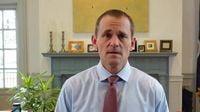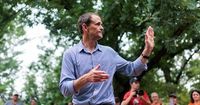University of Virginia President Jim Ryan has resigned amid mounting pressure from the Trump administration and an ongoing Department of Justice (DOJ) investigation into the university's diversity, equity, and inclusion (DEI) policies. Ryan, who has led UVA since 2018 and previously served as dean of Harvard's Graduate School of Education, submitted his resignation to the Board of Visitors on June 26, 2025, with the resignation effective immediately or no later than August 15, 2025, according to a letter obtained by The New York Times.
Ryan's resignation follows a series of escalating conflicts between the university and the DOJ, which alleges that UVA failed to fully dismantle its DEI programs despite public claims to the contrary. This investigation is part of a broader Trump administration effort to eliminate DEI initiatives nationwide, with the DOJ warning that UVA risked losing hundreds of millions of dollars in federal funding if it did not comply.
In a heartfelt email to the UVA community announcing his decision, Ryan wrote, "I am inclined to fight for what I believe in, and I believe deeply in this University. But I cannot make a unilateral decision to fight the federal government in order to save my own job. To do so would not only be quixotic but appear selfish and self-centered to the hundreds of employees who would lose their jobs, the researchers who would lose their funding, and the hundreds of students who could lose financial aid or have their visas withheld." He also noted that he had already planned to step down at the end of the next academic year for reasons unrelated to the current political pressure, including the completion of a capital campaign and strategic initiatives.
Ryan’s decision reflects the complex pressures faced by university leadership caught between federal mandates and institutional values. "While there are very important principles at play here, I would at a very practical level be fighting to keep my job for one more year while knowingly and willingly sacrificing others in this community," he said. "If this were not so distinctly tied to me personally, I may have pursued a different path. But I could not in good conscience cause real and direct harm to my colleagues and our students in order to preserve my own position."
UVA Rector Robert D. Hardie expressed profound sadness over Ryan's departure, praising him as an "extraordinary president" who led the university to "unprecedented heights" with grace and humility. "UVA has forever been changed for the better as a result of Jim's exceptional leadership," Hardie said, acknowledging Ryan's steady guidance through challenges including the global pandemic.
The DOJ’s Civil Rights Division, led by UVA Law graduates Assistant Attorney General Harmeet Dhillon and Deputy Gregory Brown, reportedly pressured Ryan to resign as a condition for settling the investigation. Dhillon emphasized the DOJ's "zero-tolerance" policy toward illegal discrimination in publicly funded universities, warning that institutions led by officials unwilling to end such practices expose themselves to legal and financial risks.
Earlier in 2025, following a January executive order by President Trump targeting DEI initiatives, UVA's Board of Visitors voted in March to dismantle the university’s central DEI office. Some programs were shifted to other departments under the belief they remained legally permissible. The DOJ extended the university’s deadline to demonstrate compliance to May 30, but alleged that UVA misrepresented its efforts and continued DEI programming nonetheless.
The political fallout has been intense. U.S. Senators Tim Kaine and Mark Warner issued a joint statement condemning the DOJ's demands as "outrageous" and an overreach into Virginia's higher education governance. "Decisions about UVA’s leadership belong solely to its Board of Visitors," they said, warning that this mistake "hurts Virginia’s future." Kaine described the federal government's actions as "shocking," "unacceptable," and "completely illegitimate," expressing disappointment that state officials, including Governor Glenn Youngkin, did not vocally defend the university.
Governor Youngkin, however, thanked Ryan for his service and expressed confidence in the Board of Visitors to appoint a strong interim leader and conduct a national search for a transformational successor. Meanwhile, the Virginia NAACP and the Democratic Senate Caucus voiced concerns about political interference undermining academic freedom and institutional integrity, emphasizing the importance of protecting diversity and inclusion efforts.
On the other side of the political spectrum, Republican lieutenant governor candidate John Reid praised Ryan’s resignation, suggesting that it was time for a change away from DEI policies, which he claimed had been rejected by voters. This division underscores the broader cultural and political battles playing out in higher education across the country.
Following the resignation announcement, hundreds of UVA students, faculty, and staff gathered in protest on the Lawn in front of the Rotunda, demonstrating support for Ryan and opposition to the federal pressure that precipitated his departure.
Ryan’s resignation marks a significant moment in the ongoing national debate over the role of DEI programs in universities and federal influence over state institutions. As four seats on the governor-appointed Board of Visitors are set to turn over on July 1, 2025, the university faces a pivotal period in leadership and policy direction.
Despite the turmoil, Ryan assured the community in remarks on campus that he remains committed to UVA’s success. "I love the University of Virginia deeply, and it's because of all of you," he said. "And regardless of my role, I will continue to do whatever I can to support this place and continue to make it the best place it can be."
The university has stated its commitment to cooperating with the DOJ and complying with federal laws, underscoring the essential role of federal support in sustaining its core missions of research, education, and clinical care.
As the search for a new president begins, UVA stands at a crossroads, balancing the demands of federal oversight, political pressures, and the aspirations of its community. The impact of Ryan’s departure and the ongoing DOJ investigation will likely reverberate beyond Charlottesville, reflecting broader national tensions surrounding diversity initiatives and academic governance.



